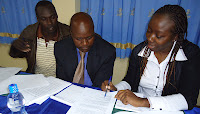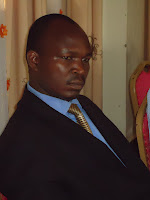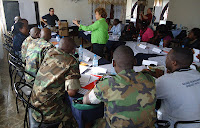Kenyan journalists won’t incite or fuel conflict during the March, 2013 election.
That pledge has been made by 37 journalists who have attended two Peace Journalism workshops this June in Eldoret and Nairobi. In these workshops, the participants, mostly radio journalists, have analyzed media’s central role in the 2007-2008 post election unrest, and promised to ensure that history does not repeat itself.
 |
| Peace Journalism seminar, Nairobi |
 |
| Peace Journalism Seminar, Nairobi |
Aside from critiquing the media’s inflammatory role in 2007/08, the seminar participants also actively crafted precise, proactive media house guidelines/policies that reflect the principles of professional Peace Journalism. The principles reflected in their station policies include being careful to avoid inflammatory, emotive, and divisive language; balancing stories by including information from all relevant parties; framing stories in such a way to avoid “pouring petrol on the fire”; telling stories that give a “voice to the voiceless”; not letting politicians use media to spread hate speech or propaganda; and taking charge of radio callers and in-studio guests so that they are not allowed to incite violence or spread hatred.
During the seminars, these principles were applied in the field by the journalists, who produced excellent peace-themed radio stories. In Eldoret, the most compelling story concerned a local group that was staging a play to spread anti-election violence messages. In the Nairobi workshop, participants produced several stories that gave voice to peacemakers. One report was about using social media as a tool for peace during the upcoming election, while a second story focused on how religious leaders and everyday citizens are joining forces to ensure a peaceful election.
 |
| PJ seminar, Nairobi |
I challenged the journalists to spread the message of responsible peace and electoral journalism among their colleagues and, crucially, to their media house management. All the well-intentioned peace journalists in the world can’t effectively eschew inflammatory reporting without the support of their editors and managers, who must realize that peace and development are desirable, profitable business models for their media houses.
If these new peace journalists can successfully engage their colleagues and their station's management, and if they continue producing peace-themed stories while systematically considering the consequences of what they report and how they report it, I’m optimistic that media induced or exacerbated violence won’t reappear next year in Kenya.
Steven Youngblood, director of the Center for Global Peace Journalism at Park University in Parkville, Missouri USA, taught the U.S. Embassy’s Peace Journalism seminars in Eldoret and Nairobi. Youngblood is a communications professor at Park University and two-time J. William Fulbright Scholar.



















